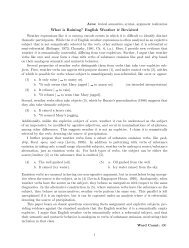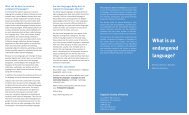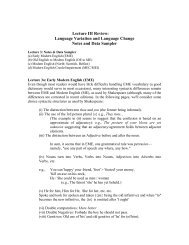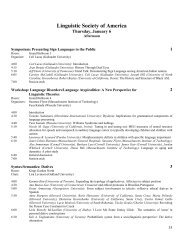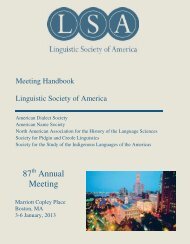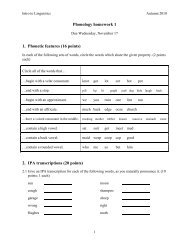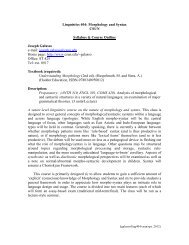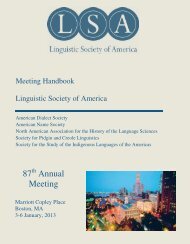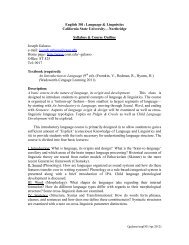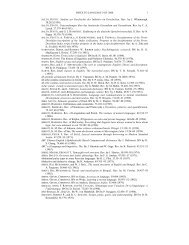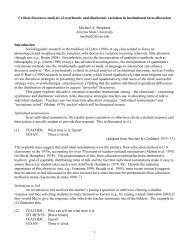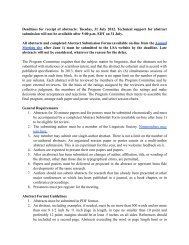View the meeting handbook - Linguistic Society of America
View the meeting handbook - Linguistic Society of America
View the meeting handbook - Linguistic Society of America
You also want an ePaper? Increase the reach of your titles
YUMPU automatically turns print PDFs into web optimized ePapers that Google loves.
Suwon Yoon (University <strong>of</strong> Chicago) Session 12An argument/adjunct asymmetry in intervention effectsI present a new set <strong>of</strong> facts that has <strong>the</strong> potential to reorient <strong>the</strong> debate on intervention effects. I have found in a series <strong>of</strong> experimentsusing magnitude estimation tasks and phonetic analysis that only argument wh-phrases trigger intervention effects and that adjunctwh-phrases do not. This novel fact is extremely surprising given much earlier work on argument/adjunct asymmetries; in fact, it isalmost diametrically <strong>the</strong> opposite <strong>of</strong> Szabolcsi and Zwarts 1993. However, I claim that it is <strong>the</strong> adjuncts that are insensitive to <strong>the</strong>interveners, calling into question a pure semantic account.Tae-Jin Yoon (University <strong>of</strong> Illinois, Urbana/Champaign) Session 18Jennifer Cole (University <strong>of</strong> Illinois, Urbana/Champaign)Mark Hasegawa-Johnson (University <strong>of</strong> Illinois, Urbana/Champaign)On <strong>the</strong> edge: Acoustic cues to layered prosodic domainsProsodic structure encodes <strong>the</strong> grouping <strong>of</strong> words into hierarchically layered prosodic constituents, including <strong>the</strong> prosodic word,intermediate phrase (ip) and intonational phrase (IP). We investigated <strong>the</strong> phonetic encoding <strong>of</strong> prosodic structure in Radio Newsspeech through analysis <strong>of</strong> <strong>the</strong> acoustic correlates <strong>of</strong> prosodic boundary and <strong>the</strong>ir interaction with accent at three levels <strong>of</strong> prosodicstructure: Word, ip, and IP. Evidence for acoustic effects <strong>of</strong> prosodic boundary is shown in measures <strong>of</strong> duration, F0, and intensitylocal to <strong>the</strong> domain-final rhyme. These findings provide strong evidence for prosodic <strong>the</strong>ory, showing acoustic correlates <strong>of</strong> a 3-waydistinction in boundary level.Nina Azumi Yoshida (University <strong>of</strong> California, Los Angeles) Session 36Nominalized predicate constructions as modals in JapanesePast studies have noted that Japanese employs <strong>the</strong> morphosyntax <strong>of</strong> nominalized predicates as a conventional way <strong>of</strong> expressingdeontic and epistemic modality. Such modal nominalized predicates (MNP) constructions characteristically take <strong>the</strong> form <strong>of</strong> apredicate nominalized by a keisiki meisi 'formal noun' and followed optionally by <strong>the</strong> copula da. This study selectively focuses on <strong>the</strong>MNP constructions no(da), koto(da), and mono(da). By analyzing <strong>the</strong> form-function relationship in Japanese between <strong>the</strong>se MNPconstructions and <strong>the</strong>ir interpretations in varying discourse contexts, it seeks to shed light on <strong>the</strong> syntactic and semantic factorsmotivating <strong>the</strong> expression <strong>of</strong> speaker modality in this manner.Keiko Yoshimura (University <strong>of</strong> Chicago) Session 17Japanese -shika 'only' as NPI universal with <strong>the</strong> semantics <strong>of</strong> exceptive markerI examine a Japanese exclusive particle -shika 'only' and provide a compositional semantic analysis. The analysis proposes that thisitem contains a universal quantifier, which needs to take wide scope with respect to negation, rejecting an alternative narrow scopeexistential approach. The proposed analysis ties in its semantic similarity to exceptive construction and its similarity in negativepolarity sensitivity to n-words in negative concord structure. In fact, this analysis <strong>of</strong> -shika aligns this item with wh-mo 'any x'paradigm in Japanese, supporting <strong>the</strong> claim that <strong>the</strong>re must be n-words that must be analyzed as universal ra<strong>the</strong>r than existential.Alan Yu (University <strong>of</strong> Chicago) Session 38The role <strong>of</strong> normalization in differential phonologizationDifferential phonologization (DP) obtains when one phonetic precursor gives rise to a new phonological pattern more readily thanano<strong>the</strong>r, even though both sets <strong>of</strong> phonetic precursors may give rise to sound changes. Moreton 2006 attributes DP to /patternselectivity/ and /phonetic precursor robustness/. While Moreton takes pattern selectivity to be key, I argue for <strong>the</strong> primacy <strong>of</strong> phoneticprecursor robustness as a principal source <strong>of</strong> DP, based on <strong>the</strong> results <strong>of</strong> an experiment looking at listeners' differential normalizationresponses to perceived duration with respect to <strong>the</strong> level, extent, and direction <strong>of</strong> /f_0 /.Hana Zabarah (Georgetown University) Session 80The 'noun' in history: A diachronic analysis in medieval Arabic grammatical <strong>the</strong>oryThe notion <strong>of</strong> ‘nouns’ developed gradually in Arabic grammatical <strong>the</strong>ory in medieval times, starting with simple descriptions to moreelaborate definitions. Examination <strong>of</strong> <strong>the</strong>se early definitions and exploring <strong>the</strong>ir development from <strong>the</strong> 2/8th century through <strong>the</strong>6/12th century should lead us to a deeper understanding <strong>of</strong> <strong>the</strong> progression <strong>of</strong> Arabic grammatical <strong>the</strong>ory <strong>of</strong> <strong>the</strong> period. I attempt t<strong>of</strong>ollow <strong>the</strong> development <strong>of</strong> <strong>the</strong>se definitions through careful study <strong>of</strong> works by well-known grammarians <strong>of</strong> <strong>the</strong> period and brieflyexamine <strong>the</strong> influence from logicians and philosophers as it pertains to <strong>the</strong> grammarians' understanding <strong>of</strong> <strong>the</strong> concept <strong>of</strong> <strong>the</strong> noun.176



